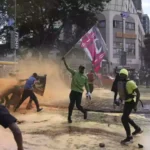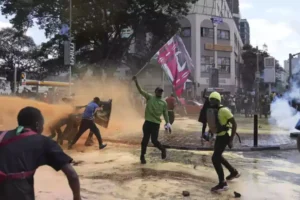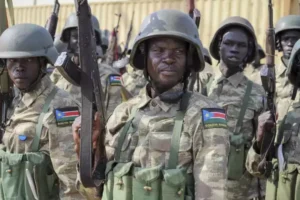Munster are the deserved new Vodacom United Rugby Championship title holders but for the vanquished DHL Stormers the past three weeks of playoff rugby was not in vain.
Head coach John Dobson owned up to what he thought was a grave error on his part by not changing his team’s approach to suit the tacky and unpredictable playing surface at the DHL Stadium. He may have been right about that. Those who walked on the field before hand spoke about how muddy it was underfoot and how slippery.
Dobson didn’t want to use the surface as an excuse, and gave a lesson to other coaches on how to be a good loser as he praised the referee for what he thought was an excellent game with the whistle and he also refused to say anything that would detract from the Munster achievement. When you win three away games, there’s no argument against you being deserved champions.
But the field didn’t suit the Stormers strengths, with the slipperiness compromising their rush defence while the way the field negates their scrumming strength has been a constant theme for months if not seasons, perhaps ever since the entire 2021 British and Irish Lions series was played at the stadium.
The Stormers’ transitioning game wasn’t ever going to be as potent as it normally is and even though it hadn’t rained for nearly two days and it was a clear evening at the time of kick-off following a sunny day, the heavy rain that fell on Cape Town on Thursday did play into the Munster hands. They were always going to profit from a tighter game with less fractured play.
MANIE A MICROCOSM OF STORMERS’ CONUNDRUM
Could the Stormers have prevailed had they adapted like Dobson says they should have? It’s a moot point now, but what is crystal clear is that the rugby that got the Stormers into the final and which won them the trophy last year is the rugby the Cape rugby public wants to see. In a way, the dilemma facing Dobson is underpinned by the same considerations that surround attitudes to Manie Libbok.
The Munster win would have lifted the Irish mood after the deflation of the Leinster defeat in the Heineken Champions Cup final the week before and it also provided an answer to the ongoing search for a suitable backup for the currently injured Jonny Sexton. After his calm and commanding performance in an away final in front of 56 000 people, Jack Crowley should feel he did enough in the Munster No 10 jersey to show he is probably the right man to understudy Sexton.
Conversely his opposite number Manie Libbok would have induced some worried frowns from Springbok fans looking forward to their team’s challenge at the Rugby World Cup in France later in the year. To put it bluntly, Libbok reminded everyone in the URC final that just as he can win games with his brilliant skills, his high risk approach and at times erratic play can also lose you games.
He’s lorded it over many other opponents in the two years of URC rugby, but Libbok has misfired against Munster twice in the space of a month and a half. He is too good a player not to be in the Bok squad for the World Cup, but those who suggest he should play ahead of the more steady Handre Pollard are being fanciful. The Stormers pivot should be part of a group, not the frontline player in his position, and he may be best used as a utility back/supersub option (he could bring a lot of X-factor from his alternative position of fullback).
But those who come down hard on Libbok on the admittedly rare days that he misfires are missing a point, as would be anyone who feels the Stormers are generally too risky – what they do is not only what makes them successful, and you just have to check out the final URC log for the last two years to confirm they win a lot more than they lose, but it is also what is bringing the fans back.
RECONNECTING WITH THE PUBLIC
The Stormers have had successful patches in the past where they’ve done so without quite connecting to their public and support base. An example is 2012, when they went unbeaten through the league phase of Super Rugby before eventually being shocked by the Sharks in the semifinal.
Perhaps if they’d gone all the way it would have been different and the end would have justified the means, but even though they topped the log their supporters still weren’t enthused. That was because they were employing a defensive orientation that was anathema to their supporters who wanted them to embrace a more attacking style.
The decline in crowd figures at Newlands from just after that period through to 2019 made quite depressing reading. By 2015 the average attendance had slipped from over 36 000 a game to 32 000 a game, but by 2019 the most supported team in Super Rugby could only claim an average attendance of 16 000.
Admittedly they were playoff games, but each of the last three games the Stormers played at DHL Stadium were watched by a crowd of more than 45 000, and for the final that was raised to more than 56 000. There was an appearance of empty spaces in the early part of the game but that can be explained by the large concourse around the stadium at the top of tier 1. There are several great vantage points to watch from there with beverage in hand and many people do that.
LOVE AFFAIR REIGNITED
The point though is that what used to be a love affair between the Stormers and their fan base had died or was dying, but thanks to Dobson and the way his team has reconnected with the perceived Cape playing style DNA, there’s been a reconnection from their rugby public.
There were only a smattering of games before the playoff phase that drew nearer to 40 000 but the numbers have been growing and there was no denying in the buildup to the final that rugby fever had swept through Cape Town. There were Stormers jerseys everywhere and everyone was talking about the game to an extent that probably hadn’t been evidenced since the famous Men in Black campaign in 1999, when Newlands was generally either packed or nearly packed but when there were far fewer competition games than there are now.
Back then the Super 12 featured just five or six home games a season and the economy was also different back then. So what the Stormers have achieved in drawing such numbers is huge for them and for South African rugby, which desperately needs the vibe at the level below Springboks to thrive for the health of the rugby business.
The defeat in the final was no doubt deflating for the Stormers supporters. You could feel it when the final whistle blew. There had been such a terrific atmosphere, even when the Stormers were under pressure for most of the first half, and then suddenly it disappeared like the air out of a balloon.
But it shouldn’t have quelled the passionate support for a team that will have a hybrid field much more suited to its playing style and strengths to play on in home games next season. What shouldn’t be forgotten either that Saturday’s experience of having a home final was a bonus brought about by Munster’s last gasp win in Dublin.
Having home ground advantage brought about an expectation that there wouldn’t have been had the Stormers played Leinster. The hosts would have been strong favourites in that game, and a Stormers loss would not have obscured the fact that they’d pulled off a major achievement by making the final two years in a row.
NO DISGRACE TO LOSE TO THIS MUNSTER TEAM
Reading some of the Irish reports there seems to be a perception that the Stormers team was loaded with Sprignboks while Munster didn’t have so many Irish internationals, but that is myth. The reality is that the Stormers had seven Boks playing for them, Munster had 12 players with international experience, with of course their overseas contingent like RG Snyman and Malakai Fekitoa counting as internationals.
The Stormers may have made mistakes and they didn’t get into the game for the first half hour, suggesting they may have been a bit overawed by the occasion, but then they were up against a team that played quite brilliantly and with huge passion. But for a few slips and slides here and there, the Stormers would still have won, but you don’t make the final if you are not a good team, particularly not if you do it the hard way like Munster did.
So there’s no disgrace in defeat this time, not against a side that has been acknowledged by all and sundry as the form team of the latter stages of the competition. And not against a team that had such unconquerable spirit and a drive that was reflected in the many tears shed after the whistle.
It wasn’t a classic because the field just didn’t allow it to be, but it was a final that was packed with drama and played out by two teams with 150 per cent commitment to their respective causes and who both at separate stages of the game came back from losing positions to prevail with their toughness and mental strength.
The Stormers did well to stay in the game in the first half, where Deon Fourie’s usual steals weren’t forthcoming to stop the stream of possession to the visitors. But Munster did well to get off the rack and win when the momentum seemed to be completely agains them later.
CAPE TEAM READY TO FLY ONCE EQUITY DEAL CONCLUDED
Should the Stormers conclude their equity deal as expected in the next few weeks Dobson will have more buying power and the franchise representing a union that has been under administration for both of the two years they’ve made the final could really start flying. ?Last year there was a feeling that their success was a one-off and it was the one opportunity they had to win silverware. Thanks to the way Dobson has built his team’s depth and the probability of more financial strength going forward, this season has shown that after this the Stormers will probably come again and play in more finals going forward. With a different result.
Source: Super Sport
















